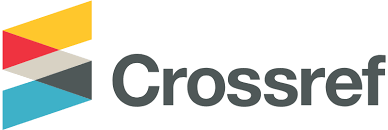PEMANFAATAN DEDAK DAN PATI GADUNG TERMODIFIKASI SEBAGAI MEDIA PERTUMBUHAN KAPANG (Monascus purpureus) PENGHASIL PIGMEN MERAH
Abstrak
ABSTRACT: This research had obtained the formulations of yam (gadung) starch and bran that can support the growth of Monascus purpureus optimally so that optimal red pigment was obtained. Apparently, by modifying gadung starch can shorten the adaptation phase of Monascus purpureus to achieve logarithmic growth. The modification was carried out by hydrolyzing gadung starch using acid and heat in order to obtain simple sugars and soluble starch which can be immediately used by the molds to grow, reproduce, and produce secondary metabolites in the form of red angkak. Hydrolysis at pH 3 resulted in starch solubility which was not significantly different from pH 3.5; 4.0; and 4.5 but significantly different from pH 5.0. The type of acid that was very effective for hydrolyzing starch was HCl. Substrate composition that can produce the most red pigment (angkak) with the highest solubility in water was the ratio (modified gadung starch : bran) 70 : 30 for 20 days of fermentation.
Kata Kunci
Teks Lengkap:
PDFReferensi
Asben, A,, Kasim, A. 2015. Studi Lama Fermentasi dan Tingkat Kadar Air dalam Produksi Pigmen Angkak pada Substrat Ampas Sagu-Tepung Beras Menggunakan Monascus purpureus. Prosiding Seminar Agroindustri dan Lokakarya Nasional FKPT-TPI Program Studi TIP-UTM, 2-3 September 2015. Pp: 185–191.
Fatimah, S., Suprihadi, A., Kusdiyantini, E. 2014. Produksi dan Kestabilan Pigmen Merah Kapang Monascus sp. Menggunakan Media Tepung Kulit Singkong dengan Penambahan Bekatul pada Konsentrasi yang Berbeda. Jurnal Biologi, 3(3): 49-59.
Ma, J., Y. Li, Q. Ye, J. Li, Y. Hua, D. Ju, D. Zhang, R. Cooper, and M. Chang., 2000. Constituents
of red yeast rice, a traditional chinesee food and medicine. Journal of Agricultural and
Food Chemistry 48: 5220-5225
Mishra, N. 2017. Utilization of waste defatted rice bran in formulation of functional cookies and its effect on physiochemical characteristic of cookies. Int J Adv Sci Res, 2(5):64-68.
Panesar, R., Kaur, S., Panesar, P.S., 2015. Production of microbial pigments utilizing agro-industrial waste: A review. Current Opinion in Food Science, 1(1): 70-76. https://doi.org/10.1016/j.cofs.2014.12.002
Puspitadewi, S.R.D., I. Srianta, N. Kusumawati. 2016. Pola produksi pigmen monascus oleh Monascus sp. KJR 2 pada media biji durian varietas petruk melalui fermentasi padat. Jurnal Tekn. Pangan dan Gizi, 15 (1): 36-42.
Srianta, I., R.M. Widharna, L.B.S. Kardono. 2013. Bioaktivitas produk fermentasi monascus. Journal of Pharmaceutical Science And Pharmacy Practice 1(1): 1-8
Sumardiono, S., I. Pudjihastuti. 2015. Pengembangan proses modifikasi cassava dengan hidrolisa asam laktat dan uv untuk substitusi terigu dalam produk pangan. Metana, 11(02): 27 – 32.
Sumaryati, E., S. Sudiyono. 2015. Kajian aktivitas antibakteri ekstrak angkak terhadap pertumbuhan bakteri Bacillus cereus dan Bacillus stearothermophillus. Teknologi Pangan: Media Informasi Dan Komunikasi Ilmiah Teknologi Pertanian, 6(1):1-11. https://doi.org/10.35891/tp.v6i1.461
Tedjautama, E., E. Zubaidah. 2014. Peningkatan produksi pigmen merah angkak tinggi lovastatin menggunakan ko-kultur Monascus purpureus dan Saccharomyces cerevisiae. Jurnal Pangan dan Agroindustri, 2 (4): 78-88
Wiyoto, H., Andriani, M.A,, Parnanto, N.H.R. 2011. Study of antioxidant activity and anti-cholesterol content on red yeast rice with substrates variation (rice, corn and dried cassava). Biofarmasi J. Nat. Prod. Biochem. 9(2): 38–44.
Wahyuningrum I., E. Zubaidah. 2016. Pengaruh Angkak dengan Penambahan Bekatul Terhadap Penurunan Profil Lipid Tikus Wistar Jantan Hiperkolesterolemia. Jurnal Pangan dan Agroindustri,4(1):127-136.
DOI: https://doi.org/10.36441/jtepakes.v4i2.1411
Article Metrics
Abstrak views : 461 times
PDF views : 370 times
Dimension Citation Metrics
Refbacks
- Saat ini tidak ada refbacks.
Article Metrics
Abstrak views : 461 timesPDF views : 370 times
Dimension Citation Metrics
Refbacks
- Saat ini tidak ada refbacks.
Refbacks
- Saat ini tidak ada refbacks.
Jurnal Ini Terindeks di:

Ciptaan disebarluaskan di bawah Lisensi Creative Commons Atribusi 4.0 Internasional.
View My Stats






